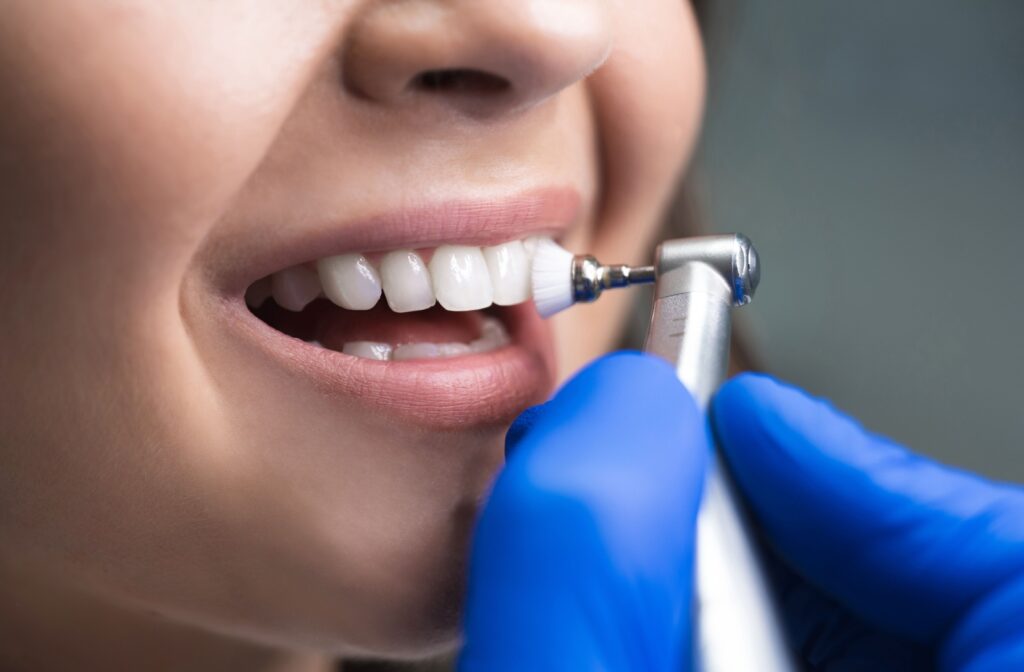Professional teeth cleaning is vital for maintaining healthy teeth and gums, but it’s not uncommon to experience discomfort afterward. If you’ve left your dentist’s office after a regular exam and cleaning only to notice that your teeth feel a little sore or extra sensitive, you may be wondering, “Is this normal?”
Unfortunately, teeth hurting after cleaning can be normal, especially if it’s been a while since you’ve visited your dentist. But the good news is that the discomfort or sensitivity you experience is typically temporary.
You should contact your dentist if the discomfort persists beyond a few days or worsens. But gentle oral care and over-the-counter (OTC) pain relievers, such as Tylenol or Advil, are typically enough to manage the increased sensitivity.
Common Sensations After Cleaning
It’s normal to experience certain sensations after a professional teeth cleaning session, even if your dentist handled the job gently. Here are a few things you might notice.
Sensitivity
You may experience heightened sensitivity to hot or cold drinks, especially if the cleaning involves removing tartar near the gum line. This sensitivity occurs because the enamel on your teeth can become more exposed after plaque is cleared away.
Soreness
Some tenderness of the gums or teeth is typical, especially if plaque buildup is significant or if gum disease is present. Your gums might feel slightly sore due to the instruments used during the cleaning.
Bleeding
Spotting a little blood isn’t unusual, particularly if there is existing gum inflammation or gingivitis. Bleeding should subside relatively quickly. Still, it’s worth monitoring it in the days following your appointment.
Reasons for Tooth Pain After Cleaning
Several factors can contribute to post-cleaning tooth pain.
Exposure of Roots
Cleaning around the gumline can remove built-up tartar that may have been shielding the roots of your teeth. When this occurs, nerve endings in the roots may become exposed, leading to increased sensitivity.
Gum Inflammation
If you visit your dentist infrequently or have gingivitis, your gums may already be inflamed. While the cleaning process is beneficial in the long run, it can temporarily aggravate this inflammation.
Pre-existing Conditions
Conditions such as cavities, gum disease, or receding gums can make teeth more susceptible to pain and discomfort after a cleaning. If your oral health is compromised, your cleaning may leave you with more tenderness than usual.
Understanding the root causes of toothache can reassure you about what’s “normal” and help pinpoint whether additional attention is needed.

How Long Should Pain Last?
Now, the key question: how long will this discomfort stick around?
Any soreness or sensitivity following a professional cleaning resolves within a day or 2 for most people. If your gums experienced significant inflammation or other issues were addressed during cleaning, the discomfort may persist slightly longer. But lingering pain for over a week could indicate an underlying problem that warrants follow-up with your dentist.
Pain that sharply increases, feels severe, or doesn’t improve over time is generally abnormal and should not be ignored. If you experience these symptoms, contact your dentist immediately.
Remedies & Relief for Post-Cleaning Discomfort
You don’t have to suffer through post-cleaning discomfort. Here are some tips for soothing your teeth and gums after a cleaning.
Practice Gentle Oral Care
Continue brushing and flossing, but be gentle, especially around your gums. Use a soft-bristled toothbrush to avoid further irritation.
OTC Pain Relievers
Medications such as ibuprofen or acetaminophen can help alleviate pain or inflammation with persistent soreness. Follow the recommended dosages and your dentist’s instructions for safe relief.
Adjust Your Diet
For the first couple of days, avoid overly hot, cold, or acidic foods and beverages. Lukewarm drinks and soft foods, such as mashed potatoes or scrambled eggs, can be more comfortable to eat during periods of heightened teeth sensitivity.
Rinse with Warm Salt Water
A saltwater rinse can soothe irritated gums and reduce inflammation. Mix a teaspoon of salt into a glass of warm water and swish it gently around your mouth a few times a day.
When to See a Dentist
While some discomfort is entirely normal, if something doesn’t feel right, you should contact your dentist. It’s better to address concerns early than to allow a potential issue to worsen. Things to watch for include:
- Pain lasts longer than a week or worsens consistently
- Your gums continue to bleed heavily or don’t stop bleeding after a few days
- You notice swelling, pus, or signs of infection
- The sensitivity makes regular eating too challenging or painful
Prevention Tips for Future Cleanings
If you’re hoping for a more comfortable experience next time, follow these simple tips to keep your teeth and gums in better shape between cleanings:
- Maintain a regular oral hygiene routine with proper brushing and flossing techniques to prevent tartar buildup.
- Schedule regular dental visits, ideally every 6 months for most people, to avoid excessive plaque accumulation.
- Use a desensitizing toothpaste to help reduce sensitivity over time.
- Eat a balanced diet to support the strength of your teeth and gums, limiting sugary or acidic foods.
- Avoid habits like smoking, which can increase the risk of gum inflammation.
Keep Smiling with Regular Care
Experiencing mild discomfort after a teeth cleaning can be unsettling, but it’s generally a natural response as your teeth and gums adjust. This temporary inconvenience can lead to improved oral health, fresher breath, and a sparkling smile.
If you’re concerned, don’t hesitate to consult your dentist. Regular checkups and a consistent oral care routine will help minimize future discomfort and keep your teeth in excellent condition.
Call our friendly team at Hill Top Dental Centre today and book your next dental exam and cleaning online with us.



